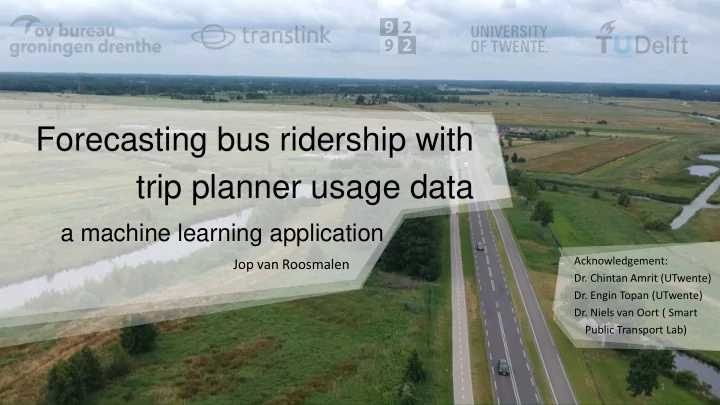

Forecasting bus ridership with trip planner usage data a machine learning application Acknowledgement: Jop van Roosmalen Dr. Chintan Amrit (UTwente) Dr. Engin Topan (UTwente) Dr. Niels van Oort ( Smart Public Transport Lab) 1
9292 Trip planner 1 2 2
Introduction Objective • Construct a forecasting model • Determine the accuracy of the models • Investigate predictive power of trip planner usage data • Determine valuable features 3
Methodology Models 𝑡 𝑡 • 𝑄𝑏𝑡𝑡𝑓𝑜𝑓𝑠 𝑡𝑢𝑝𝑞 = 𝑄𝑏𝑡𝑡𝑓𝑜𝑓𝑠 𝑡𝑢𝑝𝑞−1 + 𝐶𝑝𝑏𝑠𝑒𝑗𝑜 𝑡𝑢𝑝𝑞 − 𝐵𝑚𝑗ℎ𝑢𝑗𝑜 𝑡𝑢𝑝𝑞 = σ 𝑗=0 𝐶 𝑗 − σ 𝑗=0 𝐵 𝑗 Machine learning • Multiple linear regression • Decision tree - decision tree regressor • Random forests • Support vector regression with radial basis kernel • Artificial Neural Networks - Multi-layer Perceptron regressor Comparison with simple rules 1. Predicted number equals number last week 2. Predicted number equals historical average 4
Methodology Undersampling using stratified K-fold 5
Methodology Performance metrics 1 𝑜 (𝑧 𝑗 − ො • 𝑆𝑁𝑇𝐹 = 𝑧 𝑗 ) 2 𝑜 σ 𝑗=1 𝑧 𝑗 ) 2 σ(𝑧 𝑗 − ො • 𝑆 2 = 1 − 𝑧 𝑗 ) 2 σ(𝑧 𝑗 − ത • % of passenger count predictions correct • % of maximum passenger count predictions correct • Python, Scikit-learn 6
Case study Scope • Data from Groningen and Drenthe • 4,972 km 2 Land area • ± 1.1 mil Habitants • ± 0.2 mil Habitants Groningen City • January to March 2017 • Time period contains two smaller holidays Legend Number of habitants 7
Data Structure + 1 Trip planner Journey question 11,694,849 Journey parts 16:50 - 16:56 - 17:13 - 17:18 - 17:20 - 17:27 - 17:31 - Smart card Smart card trips 6,814,907 17:20 - 17:27 - 4,946 stops AVL data Planned + recorded 11,447,562 17:20 - 17:27 - All on vehicle level 8
Data Merging trip planner with bus data • 6 – dimensional problem • Almost no exact matches! Trip planner: Stop A to B at boarding to alighting time with line 1 Line 1 Trip 1001 Metric: Line 1 Trip 1003 Difference boarding times + Line 2 Trip 1041 difference alighting times Line 3 Trip 1013 Time Boarding Alighting 9
Data Exploratory data analysis 10
Data Exploratory data analysis 11
Data Data selection Forecasting demand for trips of line configuration g554-1-0 on workdays around 8 AM 1. 20 lines on workdays around 8 AM (56 line configurations, 4173 trips and 138,694 records) 2. 20 lines configurations for the total workday (83 line configuration, 51,471 trips and 1,523,115 records) 3. line configuration g554-1-0 for the total workday (1 line configuration, 2275 trips and 97,825 records) 4. line configuration g554-1-0 on workdays around 8 AM (1 line configuration, 239 trips and 10,277 records) 12
Data Line configuration g554-1-0 • From Roden via P+R and Groningen central Station to Hospital • 43 stops • 631 m average stop spacing • 26 km total route (partly own lane) • 61 minutes from begin to end • 6-2 busses an hour 13
Boarding Alighting Passenger Results RMSE MLR DT RF NN SVR Last week Historical avg 14
Results RMSE Passengers 15
Results Passenger prediction example • g554-1-0 • Trip 1018 • February 15, 2017 • Wednesday • 07:22 – 08:26 16
Results Percentage correct maximum passenger count predictions 1. Last week 2. Historical average Random Forests 17 ≤ ≥
Discussion Limitations • One trip planner, no session id • Only smart card 18
Conclusion Research question Can one forecast short-term ridership of buses using data containing the consulted travel advices from a widely used trip planner for public transport and what accuracy can one achieve in different scenarios? 19
Conclusion Recommendations Practice Research • Adapt data structure for data • Forecasting structure analysis • . Features: Training data: Performance metric: Models: • Include bus trip number, line - Which - Size - Average - Type number, operation date and stop - Form - Quality - Upper bound - Complexity - Scaling - Running time • Include session ID - Amount - Tuning • Trip level (bias/flexible) • Use same set of stops Forecasting performance • Models 20
Thanks for your attention jop.j@hotmail.com linkedin.com/in/jop-van-roosmalen/ Slides nielsvanoort.weblog.tudelft.nl Thesis essay.utwente.nl/77590/ 21
Recommend
More recommend